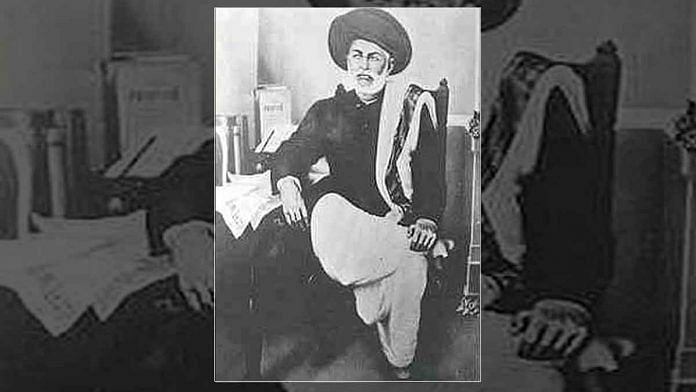New Delhi: “If the four varnas were created from the mouth, the hands, the thighs and the feet of the Brahma, then these four limbs may be termed as the respective vaginas,” wrote Jyotirao Phule in his book Gulamgiri.
Phule, who was born on 11 April 1827, challenged the very premise of the racial theory of caste using his choicest weapon — reason.
From possibly coining the term Dalit to opening the first school for women in the country, Phule was a radical thinker who practised what he preached. He fought against untouchability and gender discrimination with equal passion.
Sample this. Having been married to Savitribai, a social activist, very early in his life, Phule was advised by his coterie of friends and acquaintances to remarry since they suspected Savitribai could not conceive. Phule, however, turned down the suggestion, saying if it were the man who couldn’t conceive, the woman would never be offered such an option. He would go on to adopt a child.
On his 192nd birth anniversary, ThePrint looks at the life and legacy of the Maharashtrian reformer.
Education, the solution
Throughout Gulamgiri, Phule continuously asserted how lack of access to education was the reason for subjugation of Dalits.
Phule was acutely aware — partly due to a personal experience — that Brahmins had maintained their hegemonic control over Indian society by excluding other castes from speaking, reading or even writing Sanskrit. This was one of the reasons that led Phule to set up a school in 1848 where both Dalit men and women could study, and that too not in Sanskrit.
The move upset many across caste and gender lines. Later on, he would become a pioneer of education for women and of widow remarriage.
When the British colonial rule began, Phule saw it as a unique opportunity for the erstwhile excluded castes to gain access to education. In section 14 of his book, Phule urges Dalits to break the manacles of “inherited slavery”, while the British are around. At the same time, Phule did not stop short of criticising the British for their policies, such as employing only upper caste men in the ranks.
Also read: Ram Manohar Lohia, the socialist who wanted compulsory intercaste marriage for govt servants
A reader of Thomas Paine
Since Phule’s family was close to the Peshwa king, it is believed that he did not have to face caste discrimination early on in his life. As he grew up, the school he went to expelled him since a Brahmin clerk took exception to a shudra studying in it.
Phule later completed his education at Scottish missionary school on the insistence of family friends. Aside from being a social reformer, Phule also owned 60 acres of farmland near Pune. He was also a merchant and supplied metal casting equipment to the government.
It is believed that after Phule read Thomas Paine’s Rights of Man, a book oft-quoted by his “reformer Hindu friends”, he realised that these friends were actually Burkean in their approach — that is, they were scared that the spread of education among the socially inferior castes/classes would lead to revolution.
It is also believed that it was Paine’s text that made Phule realise the importance of education and the subsequent empowerment of women.
Phule founded the Satyashodhak Samaj (the society of truth seekers) in 1837. After marrying Savitribai, they both joined hands to wage a battle against social discrimination. Just a few years before Phule died at the age of 63, he was given the title of ‘Mahatma’ by another social reformer Vithalrao Krishnaji Vandekar.
Phule’s legacy, however, lives on with B. R. Ambedkar, who considered Phule his guru. There is a market in Mumbai named after the provocative leader, and a museum dedicated to him in Pune.
Also read: Dalit leaders have failed to acknowledge Ram Manohar Lohia’s work on social justice



